58 Facebook genders
« previous post | next post »
Facebook Diversity 2/13/2014:
When you come to Facebook to connect with the people, causes, and organizations you care about, we want you to feel comfortable being your true, authentic self. An important part of this is the expression of gender, especially when it extends beyond the definitions of just “male” or female.” So today, we’re proud to offer a new custom gender option to help you better express your own identity on Facebook.
We collaborated with our Network of Support, a group of leading LGBT advocacy organizations, to offer an extensive list of gender identities that many people use to describe themselves. Moreover, people who select a custom gender will now have the ability to choose the pronoun they’d like to be referred to publicly — male (he/his), female (she/her) or neutral (they/their).
We also have added the ability for people to control the audience with whom they want to share their custom gender. We recognize that some people face challenges sharing their true gender identity with others, and this setting gives people the ability to express themselves in an authentic way.
Here's the current list of 56 custom options, from which you get to choose up to 10:
Agender, Androgyne, Androgynous, Bigender, Cis, Cis Female, Cis Male, Cis Man, Cis Woman, Cisgender, Cisgender Female, Cisgender Male, Cisgender Man, Cisgender Woman, Female to Male, FTM, Gender Fluid, Gender Nonconforming, Gender Questioning, Gender Variant, Genderqueer, Intersex, Male to Female, MTF, Neither, Neutrois, Non-binary, Other, Pangender, Trans, Trans Female, Trans Male, Trans Man, Trans Person, Trans Woman, Trans*, Trans* Female, Trans* Male, Trans* Man, Trans* Person, Trans* Woman, Transfeminine, Transgender, Transgender Female, Transgender Male, Transgender Man, Transgender Person, Transgender Woman, Transmasculine, Transsexual, Transsexual Female, Transsexual Male, Transsexual Man, Transsexual Person, Transsexual Woman, Two-spirit
When you go to edit your gender description, the top-level menu is Male/Female/Custom. If you choose Custom, Facebook doesn't show you a menu of 56 checkboxes or whatever. Instead, you're shown a blank field:
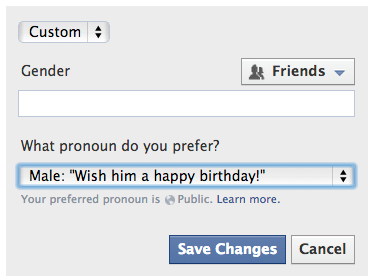
However, when you start to enter a description, you're immediately presented with a list of all the available options containing the letters you've entered:
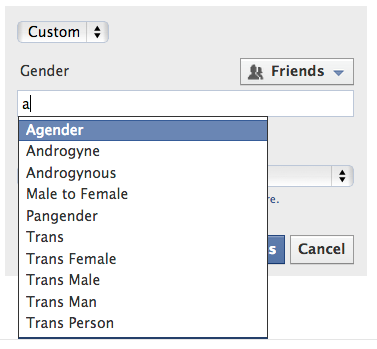
Some other examples:
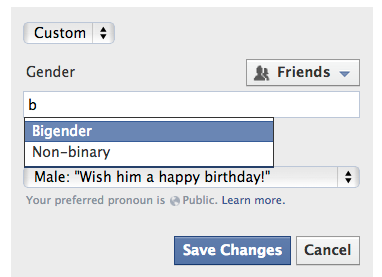 |
 |
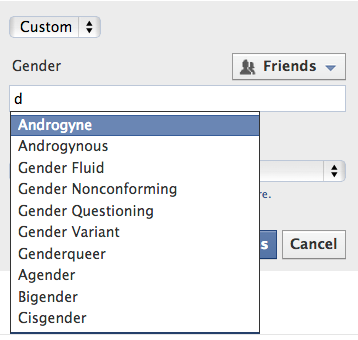 |
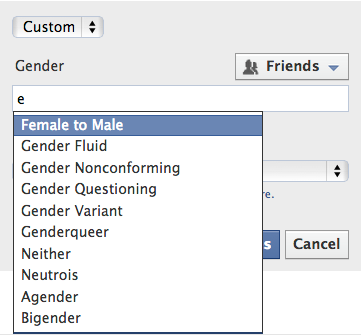 |
My favorite gender identity is missing. It was the brilliant invention of a four-year-old of my acquaintance, some years ago, as a way of protesting traditional gender-role options (or at least resisting the attempt of a somewhat bossy six-year-old to assign him one):
| Child_#1: | Let's play house! I'll be the mommy, you'll be the daddy, and Thor will be the baby. |
| Child_#2: | OK, but I have a better idea: You be the mommy, Thor can be the daddy, and I'll be the squirrel. |
"Squirrel" is not one of Facebook's new gender options, alas — when I enter it and try to save the result, I'm told that

But the impulse to re-define the game seems to be similar, even if the options are still limited.
Thor said,
February 18, 2014 @ 7:25 am
Hmmm. Apparently a simple "female" is not available.
Thor (not the squirrel!)
[(myl) "Female" and "Male" are the non-custom genders — the initial menu is male/female/custom, and if you choose "custom" then you get the other 56 options. I've modified the post to avoid this misunderstanding.]
tpr said,
February 18, 2014 @ 7:44 am
I can imagine the algorithm that determines how to sell each gender demographic to advertisers looks something like this:
If 'female'
tell user she is not a proper woman unless she buys product
else if 'male'
tell user he is not a proper man unless he buys product
else
tell user they are not a proper advocate for gender equality unless they buy product
[(myl) This doesn't seem nearly custom enough to me — lots of lost opportunity in terms of targeting within the custom categories…]
Victor Mair said,
February 18, 2014 @ 7:48 am
In case you were wondering what Cis- means:
http://www.basicrights.org/uncategorized/trans-101-cisgender/
Note that this comes from Oregon.
Kirby said,
February 18, 2014 @ 7:57 am
Apparently, the nouns change as well if you opt to change your pronoun: some users are reporting that upon selecting [they/them/their] pronouns, they show up as a "brother" or "son" on their relatives' family pages, rather than "sibling" or "child." (Besides being a poorly-designed default, it's been a problem for people who either don't identify with those terms, or who weren't out to their families yet.)
RobertL said,
February 18, 2014 @ 8:09 am
Can anyone explain the difference between Cis Male and Cisgender Male? (Ditto for female, man and woman. )
Rodger C said,
February 18, 2014 @ 8:51 am
^Probably whether you live in an environment where it's common enough to have gotten shortened already.
If there's an Androgyne, I want a Mephistopheles.
Adam B said,
February 18, 2014 @ 9:01 am
No option for "none of your business what my gender is". I guess that's not really aligned with the Facebook business model.
Aaron said,
February 18, 2014 @ 9:09 am
I suppose cis could encompass cisgender and cissexual, though the latter seems rather uncommonly used and isn't even a choice here.
Upon seeing this change, I (a transgender man, if we're counting) suggested that maybe a free text box would be better at this point. A cisgender female friend, though she was supportive of more options, was alarmed at the idea of being able to put ANY text she wanted for her gender. She was comfortable selecting female from a list, she explained, but having to actually type in her own gender identity — to decide exactly what she wanted it to be and how she wanted to describe it to others — would feel strange.
"Welcome to my world," I said.
Milan said,
February 18, 2014 @ 9:46 am
@Aaron: I see the advantages of real free text box, but I think it would attract to much insincere trolling. There is a free text field for employers and only about half of the entries are sincere in nature, the other being more or less funny jokes. If the same would happen to the gender field it wouldn't help the cause of people with non-binary gender identities. Not at least because large proportion of those jokes probably would be trans- or homophobic…
I think a good compromise would be offering the possibility to have a term checked by employees of facebook (gender studies or queer studies grad students should suffice). If it is sincere, not only can you choose it as your gender, but it will be added to the list of possible choices. Those experts might also ensure a coherent orthography.
Dan Lufkin said,
February 18, 2014 @ 10:10 am
Worker, drone, queen?
J. W. Brewer said,
February 18, 2014 @ 10:13 am
I wonder if this will be a stable set of options. There's a general problem with being all the way at the splitter end of a lumper-splitter continuum in classification, viz. it becomes increasingly difficult to tell activists (or even just ordinary people) lobbying for an addition to your list that their self-identified group is too small to be included, not materially different from a group already on the list, merely an alternative name/spelling for a group already on the list with a different designation, etc. To use a linguistics analogy, it's one thing if a lumper-oriented classification scheme treats your own language variety as a mere minor regional dialect not worthy of separate mention, but if the splitters at Ethnologue have already broken what most layfolk think of as a single language into 13 different pieces while leaving you out, what's their justification for rejecting your claim to be recognized as piece 14?
[(myl) ISO committees appear to be pretty effective at suffocating complaints of that type. Plus you get three-letter codes or whatever.]
david said,
February 18, 2014 @ 10:22 am
The Lambda Moo, a nineties text-only precursor of social media, offered the following choice of genders, each with a set of associated pronouns.
neuter, male, female, either, Spivak, splat, plural, egotistical, royal, or 2nd
You could also enter any other word. Users with the programmer skills could make up their own pronouns. I chose "happy" and made all the pronouns repeat my character name appropriately.
J. W. Brewer said,
February 18, 2014 @ 10:40 am
Now I'm wondering if one previously-rejected candidate for inclusion on the list got thrown in at the last minute because they were about to go live when someone realized they were at risk of inspiring "57 Varieties" jokes.
[(myl) Definitely an opportunity avoided.]
Bobbie said,
February 18, 2014 @ 11:33 am
One of my friends wanted to say "butch" but that choice was not offered. She (now he) settled for Transmasculine but was not sure what that meant!
peter said,
February 18, 2014 @ 12:21 pm
"When you come to Facebook to connect with the people, causes, and organizations you care about, we want you to feel comfortable being your true, authentic self."
And there you have Facebook's sophomoric view of the world in a nutshell. Who has a single "self" that they present to everyone, in all circumstances? No person I know.
dw said,
February 18, 2014 @ 12:40 pm
What's the difference between "Trans" and "Trans*" ?
Q. Pheevr said,
February 18, 2014 @ 1:10 pm
Does Facebook have a user interface in languages other than English? If so, I wonder what these choices look like in whatever other languages they have. There are so many different systems of grammatical gender out there, and so many different communities of people coming up with terms to describe their gender identities, that it would make a lot of sense to build the system of choices for each language from scratch, rather than starting with English and then trying to translate this set of options into other languages.
Eugene van der Pijll said,
February 18, 2014 @ 1:25 pm
@Q. Pheevr: at the moment, the Dutch facebook interface just gives the options Man and Vrouw. The English list contains so many synonyms, near-synonyms, and concepts with subtle differences, that I would be surprised if it was easily translatable.
At the moment, if I go to an American profile on fb, the gender is translated into Dutch. If they make a separate list of options for all languages, there would be a problem with displaying profiles in other languages. I'm curious of how they are going to solve that.
Thor said,
February 18, 2014 @ 2:05 pm
SQUIRREL!
ag said,
February 18, 2014 @ 2:48 pm
dw: "trans" usually refers to binary transgender people, that is, trans women (people who were born with male bodies but who identify as women) and trans men (people who were born with female bodies but who identify as men). The term "trans*" is a more recent innovation, used as an umbrella term for all non-cisgender people, which includes binary transgender people as well as people who identify as genderqueer, gender-fluid, agender, bigender, etc. The term is inspired at least somewhat by the use of an asterisk as a wildcard in a search. (In certain searches, the search "trans*" might match any word start with the prefix "trans".) Many non-binary-identified people (including me) feel uncomfortable with the way "trans*" purports to include other non-cisgender people by appending a footnote-esque asterisk to the word "trans"… It has a certain feeling of "trans people… oh, right, and all those other weird genderqueers, etc.".
None of this really explains why an individual would use "trans*" as a personal description of their gender, though I suppose some people do.
DWalker said,
February 18, 2014 @ 2:55 pm
Quote from a right-winger: “Of course Facebook is entitled to manage its wildly popular site as it sees fit, but here is the bottom line: It’s impossible to deny the biological reality that humanity is divided into two halves – male and female,” said Jeff Johnston, an issues analyst for Focus on the Family, an influential national religious organization based in Colorado Springs, Colo. “Those petitioning for the change insist that there are an infinite number of genders, but just saying it doesn’t make it so. That said, we have a great deal of compassion for those who reject their biological sex and believe they are the opposite sex.”
Jeff Johnston is wrong. He has apparently never heard of people with XYY chromosomes, etc.; or the people (formerly?) called hermaphrodites. Some people don't have just male OR just female body parts. (What does "the opposite sex" even mean, to someone with male and female body parts?)
The new genders that Facebook is adding go well beyond actual biological genders, and encompass gender identity (which I think is a good thing). But I'm amazed how many well-meaning people don't realize that not everyone is biologically male or female.
[(myl) In fairness to the rightwingers, the proportion of the human population that is genetically outside the binary XX/XY opposition is very small compared to the proportion who reject a binary opposition of gender identities. XYY "occurs in roughly 1 in 1,000 male births", according to Wikipedia; Androgen Insensitivity Syndrome is even rarer, with CAIS estimated to occur in 1 in 99,000 male births, and PAIS in 1 in 130,000. There's also XXY syndrome, but as far as I can tell, the overall rate of significant genetic divergence from the XX/XY opposition is on the order of 0.1% at most.
As for the role of biology (as opposed to upbringing and culture) in issues related to sexual identity, things are complicated, since in addition to whatever genomic variants are involved, there are possible epigenetic effects, issues of maternal hormone levels during fetal development, random developmental interactions, etc. But you should be careful of over-biologizing these questions, and especially of assigning much of a role to cases that don't fit the XX/XY dichotomy.]
Russell said,
February 18, 2014 @ 4:24 pm
Isn't "bigender," awfully likely to be misread?
The Cranky Professor said,
February 18, 2014 @ 4:49 pm
David –
I had a class at Emory from the unique Gayatri Spivak. I'm glad Spivak was recognized as a category of its own. God(ess/s) Spivak was. But I hope (really, really!) no one else in the world identifies as a Spivak.
The Cranky (wow, in comparison to the Spivak, I'm a Lamb) Professor.
Rubrick said,
February 18, 2014 @ 5:36 pm
And once again three- and four-spiriters get the short end of the stick….
Jerry Friedman said,
February 18, 2014 @ 5:51 pm
DWalker and MYL: I suspect you're thinking of XXY, not XYY. XYY people are generally anatomically male, and I gather from Wikipedia that XXY people (people with Klinefelter's syndrome) are too, though many have large breasts.
This Wikipedia article contains a table of the prevalence of anatomical intersex states, which are indeed mostly not the result of chromosomal abnormalities. The total is in the ballpark of 1–2% The most common of the types that are estimated is late-onset adrenal hyperplasia.
Jerry Friedman said,
February 18, 2014 @ 5:52 pm
(Large breasts for men, that is.)
J. W. Brewer said,
February 18, 2014 @ 6:00 pm
It will be interesting to see how the target audience for this innovation reacts over time. On further reflection, I find the way the user interface is structured pretty weird. I think I might well find it more irksome to begin typing my preferred self-identification into an empty box only to have it seemingly arbitrarily rejected than to have be given a pull-down menu where I could see all at once the necessarily-arbitrary-at-the-margin range of acceptable options (and thus switch gears from feeling resentment to "well, which of the available choices is the closest" if my preferred formulation was not on the list). Perhaps the theorizing above about the risks of completely open-ended self-identification (with some people not acting in good faith) is correct, but facebook has done alright with a completely open-ended (I guess subject to some maximum character limit . . .) approach to religious self-identification and that works well enough that it's hard to see how any other approach would work better.
Jerry Friedman said,
February 18, 2014 @ 6:06 pm
Are there estimates of how many people don't fit neatly into the categories of male and female, or is Facebook doing the first survey?
(In a better world, "male" and "female" would be the names of sexes and "masculine" and "feminine" would be the names of genders.)
[(myl) Some sensible people use "sex" for chromosomal categorization and "gender" for the complicated rest of it, but this usage is far from generally observed.]
D.O. said,
February 18, 2014 @ 7:26 pm
Technical question: gender Other is with respect to male/female dichotomy or to the whole list other than the Other?
AntC said,
February 18, 2014 @ 8:33 pm
@Russell, no. You're thinking of bigendian.
Robert T McQuaid said,
February 18, 2014 @ 9:18 pm
How many doors are there to the washrooms at Facebook? Fifty six, or only two?
Alex said,
February 18, 2014 @ 9:37 pm
I was really hoping "It's Complicated" would be an option. And I mean that in all seriousness!
David P said,
February 18, 2014 @ 9:49 pm
@Robert T McQuaid,
Maybe that's the solution. Eliminate the gender question and just identify the restroom you use.
[(myl) The White Dog cafe used to have four restrooms, labelled "Pointers", "Setters", "Democrats", and "Republicans". I always used to use the "Republicans" room, because it was by far the cleanest. Unfortunately the new management has relabelled them all as "Restroom" or something equally generic and boring.]
D.O. said,
February 19, 2014 @ 12:55 am
@Alex: it's called Questioning, no?
Marta said,
February 19, 2014 @ 1:29 am
@The Cranky Professor: With all due respect to the Goddess, the relevant Spivak is Michael, not Gayatri.
stanbot said,
February 19, 2014 @ 2:39 am
I wonder how many of these terms potentially overlap because they were developed by isolated communities and individuals. Then again, it is essentially a spectrum, so the shades of gender could be as plentiful as the human population.
I imagine that if someone could come up with a numeric scale, possibly similar to the Kinsey scale; it could be a better means of translating these concepts for people who are unfamiliar with them. It would need to address both the mental and physical concepts. A person could state that they are 80% physically female and 75% mentally male. Part of the reason this has become such a story is the sheer quantity of new terms (to the general populace). If people can understand it in simple terms, they could then maybe empathize on a small level. Or maybe I have too much hope.
As for the pronoun options, I am so tired of they/their. It is in use enough that no one mistakes the meaning anymore, but it is still lacking. Also, he/she squishes all 56 other options into a /. And I get annoyed that it isn't she/he at least some of the time. I have also heard people use heshe and shim to mock trans people. I wish we would adopt something else.
There was some story a while back about kids using yo for 3rd person singular. There was also the Mandarin word ta, which was discussed in this post some time ago:
http://languagelog.ldc.upenn.edu/nll/?p=8937
I propose we use be, so when speaking of people, we could say he, she, or be. That way, you don't have to be male or female, you can just be. Then bim for objective and bis /biz/ for possessive.
I do have faith that English can come up with/re-purpose/steal something that will do the job nicely.
maidhc said,
February 19, 2014 @ 5:40 am
I don't use Facebook, so I'm not really involved in this. But, if you want to give people options, why give them just 56 options? Why not just make it a text field where people can put in what they want? What's the purpose of restricting people to 56 options chosen by some committee?
And more generally, what's the purpose of having people specify their gender for all to see? Maybe some people might like to have their gender remain unspecified.
The whole thing seems really stupid and unnecessary.
Milan said,
February 19, 2014 @ 6:25 am
@maidhc: I think they came up with those options in order to prevent insincere use of the box, as it is prevalent with the "employer" and "school" field, where probably only 50% of the entries are to be taken seriously, the rest being outright jokes or obviously incorrect Also, while you do have to specify your gender, probably for the sake of customized advertising, you do not have to reveal it to other user. This was only theoretically an option before the introduction of custom genders, as the pronouns referring to you were gender-specific, but now you can choose singular they instead.
tk said,
February 19, 2014 @ 7:01 am
"[(myl) Some sensible people use "sex" for chromosomal categorization and "gender" for the complicated rest of it, but this usage is far from generally observed.]"
That what I used in my Intro Anthro classes at Seton Hall.
Alex said,
February 19, 2014 @ 9:05 am
@D.O. "Questioning" sounds like it means being in the early stages of exploring the possibility of being trans. I'm already transitioning, so I wouldn't describe myself that way. The thing is that, on the one hand, I've known for a while now that I had to transition in order to feel at home in the world. But on the other hand, I can't shake the feeling that gender is a bizarre fiction that oversimplifies the realities of bodies and minds and social structures to the point of being almost meaningless. I guess a mix of "transgender" and "genderqueer" sums things up fairly well, but, come on, it's Facebook, shouldn't "it's complicated" be an option? (I'd love a blank text field, but I understand the concerns about people using it to make transphobic jokes.)
Brett said,
February 19, 2014 @ 9:23 am
@Alex: I like, "It's complicated," for gender. Maybe Facebook can be convinced to add it.
When my wife and I first joined Facebook, there was no "married" option for relationship status. (At this point, the users were still overwhelmingly traditional college students, rather few of whom are married.) So our relationship has always said, "It's complicated"—and after seventeen years together, it is pretty complicated.
ag said,
February 19, 2014 @ 9:37 am
@maidhc: It's possible (as it was before this change) to leave one's gender unspecified on Facebook. Mine still is.
Milan said,
February 19, 2014 @ 10:34 am
@ag: If you have made an account in the last couple of years, or have changed your gender information since then, you can't leave it unspecified. Those, like you, who still have their gender unspecified are grandfathered in from times where it wasn't obligatory.
ag said,
February 19, 2014 @ 11:05 am
@Milan: Oh, really? My mistake. It's true that I changed it to "unspecified" years ago and have left it alone since then. I thought it was still possible (perhaps through some sneakiness) to unspecify it, so to speak.
badgerchild said,
February 19, 2014 @ 11:08 am
The Custom genders are available only with profiles that have Language set as English (US). If you change it to a custom gender and then change your Language setting to, say, English (UK), the gender setting changes to "Select Gender" and you have the option of selecting either Female or Male, or of leaving it unselected.
KWillets said,
February 19, 2014 @ 12:03 pm
I've worked with Facebook data in the past, and it was my impression that the gender field was always free-form text. A large percentage of them were blank, and the non-blanks ranged over dozens or hundreds of different values.
Heg said,
February 19, 2014 @ 12:30 pm
It's a commonly believed that the custom gender option is only available if your Language is set to English (US). In fact, it's also available in English (Pirate)…
Milan said,
February 19, 2014 @ 12:38 pm
@Heg: If your language is set to English (Pirate) you can choose between "Mate" (sic) "Female" and "Custom" at the drop-down menu. The list of accepted custom genders however appears to be empty. This, I guess, is rather an artifact of the fact that US and Pirate English use the same interface (with the three icons on the left) , while the other languages still use an older version (with the icons on the right), and not actually intended by the developers.
Lugubert said,
February 19, 2014 @ 2:03 pm
It would (almost) be interesting to know how FB works in Sweden in this respect. I'm there only in a close(d) group consisting of us cousins on my father's side, and I don't remember having had to make any statements on my sex/gender, relationship status or whatever. The participants all know much more of me than by any box ticking of mine.
Referring pronouns are being discussed in Sweden. An equivalent to using singular they, gaining momentum, is 'hen', a borrowing from the neutral Finnish 'hän'. Personally, I would have preferred an as is borrowing of 'hän'. Fortunately, for Swedish, both spellings can absorb the genitive -s, and our plurals are already gender/sex neutral.
Translating, I have to use a number of methods to avoid gensex bias. The 'hen' isn't sufficiently widely accepted, so I often tweak any (s)he's into Swedish plurals. There's also the fugly 'vederbörande' "person concerned, those concerned, person in question." I avoid it as much as ever possible.
DWalker said,
February 20, 2014 @ 3:25 pm
Thanks, Mark L, for the update on my comment. You raise good points. Still, if (as later posts said), "intersex" prevalence is closer to 1 or 2%, then the right-wingers categorically talking about "the opposite sex" seems pretty insensitive.
I think "it's complicated" would make an excellent choice for gender, as several people have suggested.
J.A. B. said,
February 22, 2014 @ 8:52 am
One wonders how non-binary gendered siblings will be referred to in a language that doesn't even have a word for "sibling".
Sili said,
February 22, 2014 @ 7:34 pm
I was severely puzzled due to use-mention confusion for a bit. I was sure you meant that your favourite gender identity was supposed to be "Missing".
I wonder whether Latinists or chemists find it easiest to understand cis-?
What Facebook's 58 Genders Mean For Politics - Forbes said,
February 24, 2014 @ 8:44 am
[…] very recently introduced a drop-down menu with 58 gender identity choices to embellish the classic Male and Female. It includes arcane categories such as […]
trlkly said,
April 20, 2014 @ 10:58 am
If they didn't want free-form answers, why did they use a text box? Why not a combo box that both lists all options but lets you type them? Why make you have to type 26 different letters before you can see the entire list and pick the one that's closest?